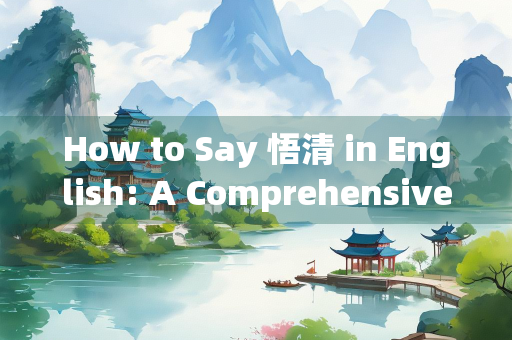Introduction

Language is a bridge that connects cultures, ideas, and philosophies. Translating concepts from One language to another can sometimes be challenging, especially when dealing with words that carry deep cultural or philosophical meanings. One such word is & quot ;悟清" (wù qīng) in Chinese. This term embodies a sense of enlightenment, clarity, and deep understanding. But how do we accurately convey its essence in English?
In this article, we will explore the meaning of "悟清," examine possible English translations, and discuss the nuances behind each interpretation. By the end, you will have a clearer understanding of how to express this profound concept in English.
Understanding "悟清" in Chinese
Before attempting to translate "悟清," it is essential to grasp its meaning in Chinese.
1、悟 (wù) – This character represents enlightenment, realization, or awakening. It is often associated with Buddhist and Daoist philosophies, where it refers to the moment of profound insight or understanding of truth.
2、清 (qīng) – This character means "clear," "pure," or "transparent." It can describe both physical clarity (e.g., clear water) and mental clarity (e.g., a clear mind).
When combined,"悟清" (wù qīng) suggests a state ofclear enlightenment—a moment or process where one gains deep, unobstructed understanding. It implies not just intellectual comprehension but also a spiritual or experiential realization.
Possible English Translations of "悟清"
Given its layered meaning, "悟清" does not have a direct one-word equivalent in English. However, several phrases and terms can capture different aspects of its essence:
1. "Attain Clarity"
Explanation: This phrase emphasizes the process of reaching a clear understanding.
Example: *After years of meditation, he finally attained clarity about the nature of existence.
Pros: Simple and direct.
Cons: May lack the depth of spiritual enlightenment implied in "悟清."
2. "Realize Clearly"
Explanation: Focuses on the moment of realization with full awareness.
Example: *She realized clearly that material wealth does not bring true h app iness.
Pros: Captures the cognitive aspect of "悟."
Cons: Less poetic and may not fully convey the spiritual dimension.
3. "Awaken to Clarity"
Explanation: Combines the idea of awakening ("悟") with mental clarity ("清").
Example: *Through deep contemplation, he awakened to clarity about his life's purpose.
Pros: More evocative and aligns with spiritual awakening.
Cons: Slightly abstract and may require context.
4. "Achieve Enlightenment"
Explanation: Strongly tied to Buddhist and philosophical traditions.
Example: *The monk spent decades in solitude to achieve enlightenment.
Pros: Directly relates to spiritual awakening.
Cons: May sound too formal or religious in some contexts.
5. "Gain Insightful Clarity"
Explanation: Highlights both deep understanding ("insight") and mental purity ("clarity").
Example: *The philosopher gained insightful clarity after years of study.
Pros: Balances intellectual and spiritual aspects.
Cons: Slightly wordy.
6. "See Through with Understanding"
Explanation: A more metaphorical translation, suggesting penetrating insight.
Example: *She saw through the illusions of life with deep understanding.
Pros: Poetic and profound.
Cons: May be too abstract for everyday use.
Cultural and Philosophical Context
To fully appreciate how to translate "悟清," we must consider its cultural and philosophical roots:
1. Buddhism and Daoism
- In Buddhism, "悟" (wù) is central to concepts like"enlightenment" (觉悟, juéwù) and"awakening" (开悟, kāiwù).
- Daoism emphasizes"clarity" (清, qīng) as a state of harmony with nature and the universe.
- Thus, "悟清" can be seen as a fusion of these traditions—a clear, enlightened mind free from delusion.
- Outside religious contexts, "悟清" can describe moments ofsudden clarity in daily life, such as solving a complex problem or understanding a personal truth.
- Example: *After the accident, he 悟清 (wù qīng) that life is fragile and precious.
Which Translation Fits Best?
The best translation depends on the context:
1、For spiritual or philosophical discussions:
- *"Attain enlightenment with clarity"
- *"Awaken to pure understanding"
2、For everyday use (e.g., personal realizations):
- *"Come to a clear realization"
- *"Gain deep clarity"
3、For poetic or literary expressions:
- *"See the truth with crystalline clarity"
- *"Pierce through illusion into understanding"
Conclusion: The Beauty of Untranslatable Words
"悟清" is one of those words that remind us of the richness of language. While English may not have a single-word equivalent, we can still convey its essence through thoughtful phrasing. Whether you choose *"attain clarity,"* *"awaken to understanding,"* or another expression, the key is to preserve its depth and significance.
In the end, translation is not just about finding the right words—it's aboutcapturing the soul of the meaning. And perhaps, in exploring how to say "悟清" in English, we too gain a little more clarity ourselves.
Language is a mirror of human experience. Some words, like "悟清," challenge us to think beyond literal meanings and embrace the wisdom they carry. The next time you encounter a profound realization, ask yourself: *Have I just experienced a moment of "悟清"?* And if so, how would you express it in English?
*(Word count: 1,589)
本文地址: https://www.shuiwy.com/a/98526.html
文章来源:im
版权声明:除非特别标注,否则均为本站原创文章,转载时请以链接形式注明文章出处。
2026-02-22im
2026-02-22im
2026-02-22im
2026-02-22im
2026-02-22im
2026-02-22im
2026-02-22im
2026-02-22im
2026-02-22im
2026-02-22im
2024-03-03im
2024-01-24im
2023-05-29im
2023-06-04im
2023-06-16im
2023-10-07im
2023-06-20im
2023-10-07im
2023-06-19im
2023-06-14im
2025-01-15im
2024-04-28im
2025-05-05im
2024-01-08im
2024-01-08im
2024-01-09im
2024-01-08im
2025-05-03im
2025-04-22im
2023-08-10im
扫码二维码
获取最新动态
